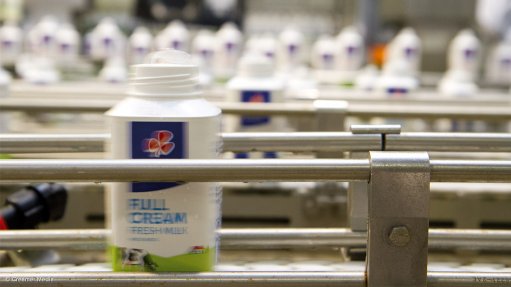
With greater manufacturing and distribution capacities installed, JSE-listed Clover is looking to enter new product categories and aiming for its new value-added products to make up 20% of Clover Industries’ business over the medium term.
At a media briefing in Rosebank on Tuesday, Clover executive of brands and corporate development Marcelo Palmeiro pointed out that when the dairy products producer considered whether to enter a new category it looked at the volumes required, how novel the concept was and the number of competitors in the market.
A new category needed to present the opportunity to produce big volumes and the number of competitors in the market should be few. The key performance indicators highlighted by Palmeiro included doubling the profit level of the category in five years and a payback period of two to three years.
Having recently re-entered the yoghurt and custard market, as its restraint of trade agreement with multinational food products corporation Danone expired on January 1, the company received an overwhelming response that surpassed the capacity of its recently acquired DairyBelle facility, in Bloemfontein.
As a result, the company was currently undersupplying the market by between 60% and 70% as the facility’s capacity, which had been expected to be adequate for two years, was unable to meet demand after two months.
Initially, Clover estimated that it would require R25-million for the year ahead to improve the efficiencies and capacity of the yoghurt factory.
However, to meet demand, Clover was now spending between R65-million and R75-million to double its yoghurt capacity through the installation of a new production line at the DairyBelle facility, which was operating three shifts a day, seven days a week. The new processing and packaging line would be installed from September.
Clover CEO Johann Vorster, who also spoke at the briefing, cautioned, however, that it was yet to be seen whether the demand was a result of novelty or whether there would be repeat sales.
With the introduction of the Clover The Classic yoghurt custard, the company was competing with Danone’s Nutriday and Ultra Mel, which was originally a Clover brand about 40 years ago. “The new range affords us the opportunity to claim our share in the current yoghurt and custard markets, estimated at R3.6-billion and R675-million, respectively,” noted Vorster.
The company also intended to relaunch DairyBelle’s Fruits of the Forest brand, which currently held a 35% market share, as well as its Bliss double cream yoghurt. The Bliss brand would also be extended to include desserts, such as tiramisu and crème caramel, to create an umbrella brand for what Clover termed “indulgent products”. The dessert market was currently valued at R880-million.
Clover had also entered into a 50:50 joint venture with functional food company Futurelife to launch the Clover Futurelife Smart Drink, an on-the-go dairy snack, and other products.
Palmeiro explained that the partnership was in line with the company’s aim of introducing “innovative and profitable functional food products”.
Meanwhile, in terms of expanding into other African countries, Palmeiro noted that Clover did not favour exporting to these countries, but rather manufacturing high-quality products locally.
“We are the biggest dairy company by far in Africa and have a lot to offer the consumers and local dairy companies,” explained Palmeiro, noting that Clover intended to identify partners with which it could create a network.
At first, Clover intended to be a minority shareholder, bringing its name, equipment and experience to the table and growing its shareholding over the years.
Palmeiro advised that the company was interested in investing and developing local brands while also introducing the Clover brand to the rest of Africa, particularly those that surrounded South Africa, such as Zimbabwe, Angola and Mozambique, and East Africa.
In Mozambique, Clover, which was not present in the country one year ago, had built up a distributorship, generating an estimated $1-million a month. The company currently did not have a local setup as Mozambique’s close proximity to South Africa made it an easy export destination.
To conclude, Vorster advised that in spite of short-term growth constraints, such as the increasingly difficult operating environment, Clover would continue to focus on achieving its long-term objectives of “delivering synergistic acquisitions and partnerships by actively investing in new innovative products and technologies”.